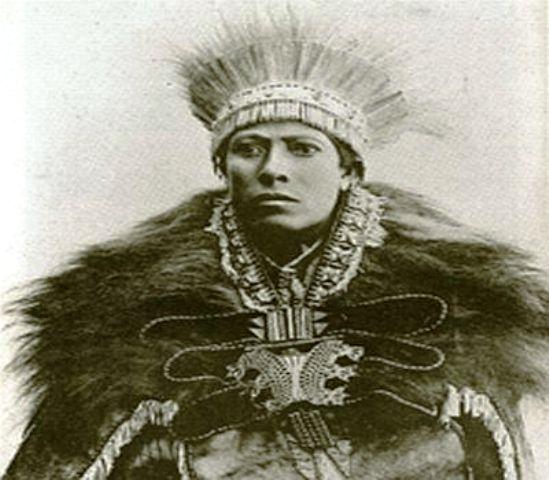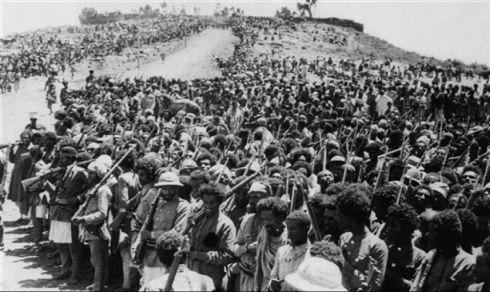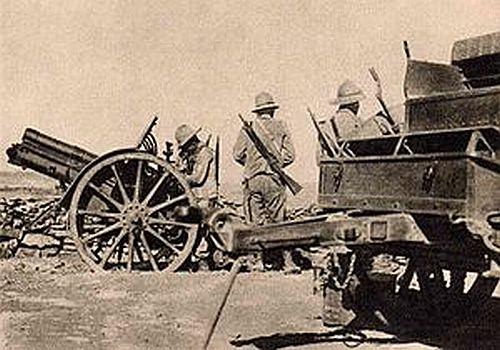
Dejazmach Balcha Aba Nefso
Dejazmach Balcha Safo (1863 - 6 November 1936), popularly referred to by his "horse-name" Balcha Aba Nefso, was an accomplished Ethiopian military commander, who served in both the First and Second Italo-Ethiopian Wars.Although he came from a non-aristocratic background, he was made a dejazmach. Balcha also became a provincial Governor (Shum), and eventually became a key member of the conservative provincial elite who, in the 1920s, were often at odds with the modernizing reforms and rising power of the Regent, Ras Tafari Makonnen (later Emperor Haile Selassie I).
Tafari would force Dejazmach Balcha into retirement, albeit an honourable one, in 1928, from which he would emerge in 1935 to fight the Fascist invaders, by whom he was killed in 1936.
Early Life
Balcha was found on a battlefield in Gurageland after having been emasculated, which at the time was the usual fate of defeated soldiers. He came to the notice of Emperor Menelik II, who brought him back to Addis Ababa where Balcha was educated.
Balcha is believed to be of Oromo descent; 'Balcha' means 'taming, assimilating or making familiar with' in Afaan Oromo. But there are also many Gurage people who use Oromo names because of their geographical assimilation with the Oromo.
He distinguished himself at the imperial court and showed particular skill in military exercises and theory. He made his reputation, according to oral tradition, in the Battle of Mek'ele, and later at the Battle of Adwa (March 1, 1896), and was rewarded with elevation to the aristocratic status of dejazmach.
From 1898 to 1908, Balcha was Shum of Sidamo province. After the death of Dejazmach Yilma Makonnen in 1907, he became the Shum of Harar from 1910 to 1914. From 1917 to 1928, he again served as Shum of Sidamo.
Conflict with Haile Selassie

Soon after becoming king in 1928, Nigus Taffari recieved yet another challenge from the forces of conservatism. Dejazmatch Balcha Saffo, had briefly succeeded Dejazmatch Yilma Makonnen as governor of Harrar, but upon his replacement by the then Dejazmatch Taffari in 1910, he had been appointed Governor of the wealthy gold, ivory and coffee producing province of Sidamo.
Now he arrived in Addis Ababa from Sidamo with a very large number of well armed men. He had repeatedly refused the summons of the new King to come to the Capital, and only obeyed now because he had recieced a summons from the Empress.
Dejazmatch Balcha and his army encamped at Nifas Silk, just outside the city, and the presence of Balcha's large Army was regarded as being a direct challenge to the king, in support of the Empress and the conservatives she supported.

On the second evening after his arrival, Dejazmatch Balcha and his leading officers were invited by King Taffari to come to the Imperial Palace for dinner. They arrived to find a fine feast prepared for them, and much to drink.
As the evening wore on, and Balcha's officers grew more and more intoxicated, they also grew more and more insulting to the king and his supporters as they sang songs as was customary.
When the Dejazmatch and his followers finally returned to Nifas Silk, they were stunned to find that his entire army had vanished. While they had been eating and drinking at the palace, Ras Kassa Hailu and several other officials had arrived at Nifas Silk with a bag of Silver Maria Theresa Thallers, and another bag of whips.
They announced to Balcha's army that a new governor, Ras Birru, had been appointed for Sidamo and that they were to report to him at once.
They were instructed to immediately accept payment in the silver coins, surrender their weapons and go home. The bag of whips was left in clear view to show what would happen to anyone who did not obey.
Within a short time, the soldiers had surrendered their weapons, recieved their payment and were headed back to their farms and families in the south. When Dejazmatch Balcha realized what had happened he fled to the Raguel Church on Mt. Entoto and rang the bell, a traditional plea for royal mercy in Ethiopia that monarchs were required to honor.
The King confined Balcha to a monastery, but did not punish him further.
Death

When Italy invaded in the Second Italo-Abyssinian War, Balcha Safo came out of retirement to fight against the Italians. Major Mesfin Seleshi, an agent of the imperial government in exile who was coordinating resistance in occupied Ethiopia, writes of his fate in a letter to Haile Selassie I thus:
"The enemy went as far as Gurage, where his Excellency Dejazmatch Balcha lives, and campaigned against him. The people betrayed him, and all his men were annihilated. He and two of his servants, three people all together, were surrounded. A white man came to him and asked, are you Dejazmatch Balcha? When he said yes I am, the white man said, surrender your arms, and untie your pistol [belt]. Dejazmatch Balcha said, 'I am not here to surrender my arms', and he killed the white man; then, he and his two servants died instantly without having much suffering."
